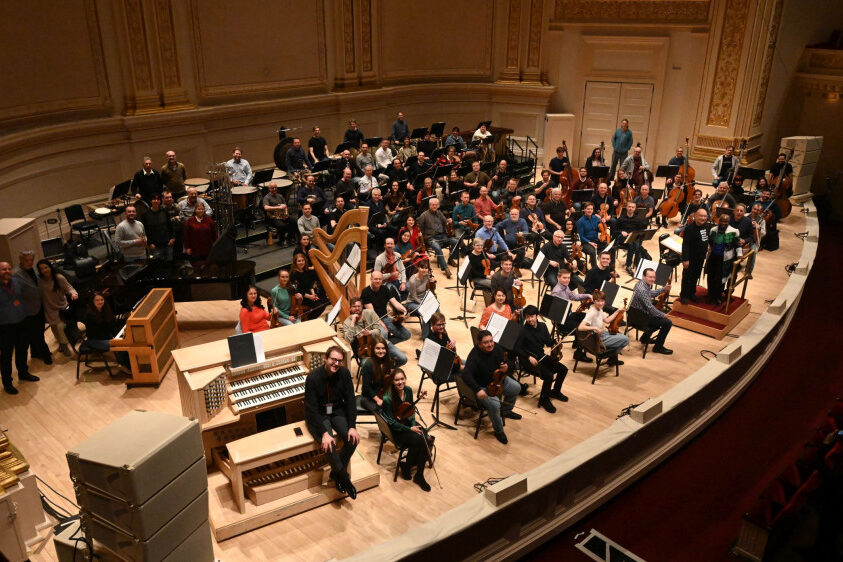PRESS RELEASE Brno, 24. 2. 2023
Filharmonie Brno returned from its American tour – the most crucial in the orchestra’s history – two days ago. In seven cities and five states, it showcased a mix of less well-known Czech music and contemporary American works. “It’s incredible how enthusiastic the audience there was. I admit that I had slight worries over how they would respond to Martinů and Janáček, but the applause that broke out after their works was like ones only seen here at the end of concerts,” says Managing Director of Filharmonie Brno, Marie Kučerová.
The tour began on the world’s most famous stage: New York’s Carnegie Hall. Here, the audience gave a standing ovation after the first half, which featured Czech composers. The second half then unleashed a rapturous frenzy in the hall. One reason for this was that the programme featured Philip Glass’s Symphony No. 12 (Lodger), a piece by one of the greatest contemporary composers, who personally came to the concert, and which was played in its New York premiere. The audience welcomed Glass with a standing ovation even before his symphony had begun. “Undoubtedly every musician longs to play in Carnegie Hall. For myself as an American, it was a truly emotional experience, including because I saw my family there for the first time in a number of years. I was proud that I could play for them with my orchestra and at such a venue,” explained Filharmonie Brno solo horn player, Nicolas Perez.
At two concerts, the orchestra performed alongside local musicians: in Ann Arbor, Michigan and in Lubbock, Texas. The programme there featured Janáček’s Sinfonietta, which requires a brass band in addition to the orchestra. “Furthermore, in Ann Arbor we incorporated the local hundred-and-twenty-member choir and soloists in our rendition of Glagolithic Mass,” says orchestra manager, Pavel Šindelář. He adds that 86 Filharmonie Brno musicians crossed the pond, and they also undertook sixteen domestic flights within the States. For some of these flights, the orchestra had to split up into two halves, because they could not all fit into the one plane. “The whole tour was extremely demanding in terms of production. Preparing the musicians, the instruments, insuring the instruments and securing special certificates for the rare plant and animal materials they incorporate, working visas and vaccination certificates… And that’s just a fraction of everything we had to arrange,” says orchestra manager, Pavel Šindelář, who arranged tour production and accompanied the orchestra the whole time.
He says that the preparations for the tour essentially began with the arrival of Chief Conductor Dennis Russell Davies in Brno five years ago. “He was born in America, he began his career there, and he has loads of ties and contacts there. Right after he joined, he told us that we had to cross the ocean as an orchestra. The tour acquired clearer shape two years ago, and it involved intensive work every day for the past year,” says Šindelář.
Each concert featured a programme specially arranged for the place it was played. In Kansas City, for example, it featured Laurie Anderson as a soloist with her piece Amelia, dedicated to Amelia Earhart, the first women to fly around the world – and who was born a few kilometres from Kansas. In Ann Arbor, the programme featured William Bolcom, a composer who lives near the city.
Solo clarinettist, Lukáš Daňhel, was thrilled not just with the audience reaction, but also with the concert halls. “I think the best hall was in Kansas City. Those acoustics! It wasn’t just the audience who appreciated it, but so did we. We played Dvořák’s Othello there, and from rehearsals in one venue it’s been noted that I need to play louder. But there, the Chief Conductor instead needed me to turn the volume down a number of times. What I mean is that the first class acoustics means we can hear each other really well, and we can literally play with the sound of our instruments, their colour, reach pianissimos that would be impossible in other halls,” notes Daňhel. He described as a miracle the fact that all the halls were full and how the audience responded. “It is no exaggeration to say that it could never have occurred to me how warmly they would embrace music they essentially don’t know, that so many people would come to see an unknown European orchestra. Those impressions are incredibly powerful,” he adds.
Filharmonie Brno made a return to the United States of America almost fifty years since the last time. Over the whole tour, it was headed by Chief Conductor Dennis Russell Davies. Performing as soloists with the orchestra were five-time Grammy winner Angélique Kidjo, organist Christian Schmitt, pianist Maki Namekawa and performer Laurie Anderson.
The tour was possible thanks to significant funding from the City of Brno Council, the South Bohemian Region, the Ministry of Culture of the Czech Republic and the National Recovery Plan, funded by the European Union. “We would like to thank them so much. Through their support, thousands of Americans have discovered Martinů and Janáček. Many people came to us after the concerts, and asked us where Brno is and if Janáček really created such wonderful work. It was a great representation of Czech music and the Czech Republic,” concludes Kučerová.
Contact for media Kateřina Konečná, Head of PR and Marketing, Filharmonie Brno
+420 775 426 040 katerina.konecna@filharmonie-brno.cz





